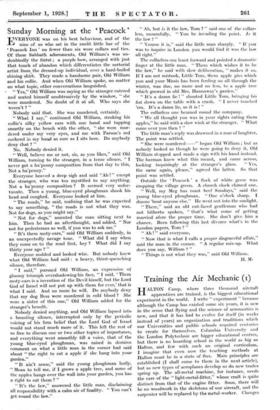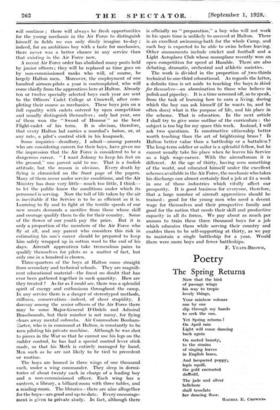Training the Air Mechanic (1)
HALTON Camp, where three thousand aircraft apprentices are trained, is the biggest educational experiment in the world. I write " experiment " because although the Camp has existed some six years, it is new in the sense that flying and the science of aeronautics is new, and that it has had to evolve for itself (in weeks instead of years) an organization and traditions which our Universities and public schools required centuries to create for themselves. Columbia University and the London Polytechnic are bigger educational centres, but there is no boarding school in the world as big as Halton, and few with such an original curriculum. I imagine that even now the teaching methods at Halton must be in a state of flux. Main principles are established (I shall come to them in the next article), but as new types of aeroplanes develop so do new trades spring up. The all-metal machine, for instance, needs the care of the " light-metal-fitter," whose craft is quite distinct from that of the engine fitter. Soon, there will be no woodwork in the skeletons of our aircraft, and the carpenter will be replaced by the metal-worker. Changes will continue ; there will always be fresh opportunities for the young mechanic in the Air Force to distinguish himself in fields we can only dimly imagine to-day ; indeed, for an ambitious boy with a taste for mechanics, there never was a better chance in any service than that existing in the Air Force now.
A recent Air Force order has 'abolished many posts held by junior officers; they will be replaced as time goes on by non-commissioned ranks who will, of course, be largely Halton men. Moreover, the employment of one hundred airmen-pilots a year is contemplated, who will come chiefly from the apprentices here at Halton. Already ten or twelve specially selected boys each year are sent to the Officers' Cadet College at Cranwell, after com- pleting their course as mechanics. These boys join on a full equality with cadets entered by open competition and usually distinguish themselves ; only last year, one of them won the " Sword of Honour " as the best Flight-cadet of his term. It is obvious, therefore, that every Halton lad carries a marshal's baton, or, at any rate, a pilot's control stick in his knapsack.
Some inquiries--desultory, I admit—among parents who are considering careers for their boys, have given me the impression that the Air Force is considered to be a dangerous career. " I want Johnny to keep his feet on the ground," one parent said to me. That is a foolish attitude, but the reason is obvious. Every death by flying is chronicled on the front page of the papers. Many of them occur under service conditions, and the Air Ministry has done very little—much too little, I think— to let the public know the conditions under which its personnel is serving. Now the toll of life taken by the air is inevitable if the Service is to be as efficient as it is. Learning to fly and to fight at the terrific speeds of our new scouts demands a sacrifice from those whose skill and courage qualify them to die for their country. Some of the flower of our youth pay the price. But it is only a proportion of the members of the Air Force who fly at all, and any parent who considers this risk in estimating his son's career should be prepared to keep him safely wrapped up in cotton wool to the end of his days. Aircraft apprentices take tremendous pains to qualify themselves for pilots as a matter of fact, but only one in a hundred is chosen.
Three-quarters of the boys at Halton come straight from secondary and technical schools. They are magnifi- cent educational material—the finest no doubt that has ever been gathered together in such quantity. How are they treated ? As far as I could see, there was a splendid spirit of energy and enthusiasm throughout the camp. In any service there is a danger of stereotyped methods, stiffness, conservatism—indeed, of sheer stupidity. I daresay among the senior officers of the Air Force there may be some Major-General D'Ordels and Admiral Brassbounds, but their number is not many, for flying clears away mental cobwebs. Air Commodore Bonham- 'Carter, who is in command at Halton, is constantly to be teen piloting his private machine. Although he was shot to pieces in the War so that he cannot use his legs on the rudder control, he has had a special control lever stick made, so that his'Moth is entirely managed by hand. Men such as he are not likely to be tied to precedent or routine.
The boys are housed in three wings of one thousand each, under a wing commander. They sleep in dormi- tories of about twenty each in charge of a leading boy and a non-commissioned officer. Each wing has a canteen, a library, a billiard-room with three tables, and a reading:room. The libraries—there are nine altogether for the boys—are good and up-tO-Clate. Every encourage- ment is given to private study. In fact, although there is officially no `•` preparation," a boy who will not work in his spare time is unlikely to succeed at Halton. There is in excellent swimming-bath for the whole Camp, and each boy is expected to be able to swim before leaving. Other amusements include cricket and football and a Light Aeroplane Club whose monoplane recently won an open competition for speed at Ramble. There are also debating, dramatic, orchestral and athletic societies.
The work is divided in the proportion of ,two-thirds technical to one-third educational. As regards the latter, a definite time is set aside to teaching the boys to think for themselves—an abomination to those who believe in polish and pipeclay. It is a time screened off, so to speak, from the task of learning how to earn a living, during which the boy can ask himself (if he wants to, and he often does) what is the purpose of life, and his place in the scheme. That is education. In the next article I shall try to give some outline of the curriculum : the subject is too big for my space this week. Instead, I will ask two questions. Is constructive citizenship' better worth teaching than the art of brightening brass ? Is Halton better value than a battleship or a battalion ? The long-term soldier or sailor is a splendid fellow, but he cannot usually take his place when he leaves his Service as a high wage-earner. With the aircraftsman it is different. At the age of thirty, having seen something of the world, and educated himself under the excellent schemes available in the Air Force, the mechanic who takes his discharge can almost certainly find a job at £4 a week in one of those industries which vitally affect our prosperity. It is good business for everyone, therefore, that a large number of aircraft apprentices should be trained : good for the young men who need a decent wage for themselves and their prospective family and good for the nation that needs their skill and productive capacity in all its forms. We pay about as much per annum to train these three thousand boys for a job which educates them while serving their country and enables them to be self-supporting at thirty, as we pay to maintain a single battleship for a year. Would there were more boys and fewer battleships.
F. YEATS-BROWN.































 Previous page
Previous page